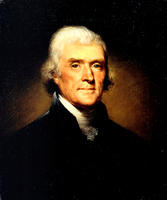
Tiahrt response to Pledge of Allegiance ruling
“This extreme ruling ignores accepted tradition, the will of a majority of the American people and most importantly – it ignores historic fact and law. It is an extraordinary leap to rule that allowing public school children to say the words “under God” is establishing a national religion.”
Picture of Thomas Jefferson
Comment:
The “under God” portion of the pledge was instituted during the Joseph McCarthy witch hunts of the 1950s and was supposed to indoctrinate our children with the idea that we are “God believing capitalists” as opposed to “Godless Marxists,” (as in the Soviet Union).
Tiahrt said:
“It is a sad day when a federal judge can distort the Constitution and disavow the intent of the people who wrote it, and it seriously calls into question the competence of the jurist making the decision. Not only were 51 of 55 constitutional delegates professed men of faith who sought guidance from their creator in writing the Constitution, there are numerous supporting documents indicating they believed it was imperative that God’s word be taught in the classroom. Of the four delegates who did not profess a Christian faith, it was Benjamin Franklin who suggested that the delegates begin their day with prayer. It is ludicrous to think that a body that started its sessions in prayer would believe it was improper to cite the name of the creator from whom they sought guidance.”
Comments:
By the 1700s the Republican movement was sweeping Europe, challenging the Divine Right theory in favor of modern capitalism, where a person could earn property, wealth and political power. Two important supporters of this movement in the U.S. were Thomas Jefferson and Tom Paine. Our founding fathers were also getting sick and tired of the constant fighting over religion in Europe, so they inserted the first amendment preventing our new country of having an official religion. Even then the amendment was interpreted differently by different politicians.
The religious right is always glad to quote from George Washington farewell address:
“Of all the dispositions and habits which lead to political prosperity, religion and morality are indispensable supports. In vain would that man claim the tribute of patriotism, who should labor to subvert these great pillars of human happiness, these firmest props of the duties of men and citizens. The mere politician, equally with the pious man, ought to respect and to cherish them. A volume could not trace all their connections with private and public felicity. Let it simply be asked: Where is the security for property, for reputation, for life, if the sense of religious obligation desert the oaths which are the instruments of investigation in courts of justice? And let us with caution indulge the supposition that morality can be maintained without religion. Whatever may be conceded to the influence of refined education on minds of peculiar structure, reason and experience both forbid us to expect that national morality can prevail in exclusion of religious principle.”[1]
They won’t quote Thomas Jefferson when he said to congress:
“Believing with you that religion is a matter which lies solely between man and his God, that he owes account to none other for his faith or his worship, that the legislative powers of government reach act of the whole American people which declared that their legislature should “make no law respecting an establishment of religion, or prohibiting the free exercise thereof,” thus building a wall of separation between Church and State.”[2]
Jefferson was a deist and influenced by Epicurus:
“Epictetus and Epicurus give laws for governing ourselves, Jesus a supplemental of the duties and charities we owe to others. The establishment of the innocent and genuine character of this benevolent Moralist, and the rescuing it from the imputation of imposture which has resulted from artificial systems, invented by ultra-Christian sects, unauthorized by a single world or uttered by Him.”[3]
Jefferson saw Jesus as a philosopher and not as a divine deity:
“The question of his being a member of the Godhead, or in direct communication with it, claimed for him by some of his followers, and denied by others, is foreign to the present view, which is merely an estimate of the intrinsic merits of his doctrines.”[4]
[1] “Washington's Farewell Address 1796,” The Avalon Project at Yale Law School,
http://www.yale.edu/lawweb/avalon/washing.htm.
[2] Thomas Jefferson, The Life and Selected Writings of, (The Modern Library, New York, 1998) p. 307.
[3] Jefferson, p. 634.
[4] Jefferson, p. 522.

No comments:
Post a Comment